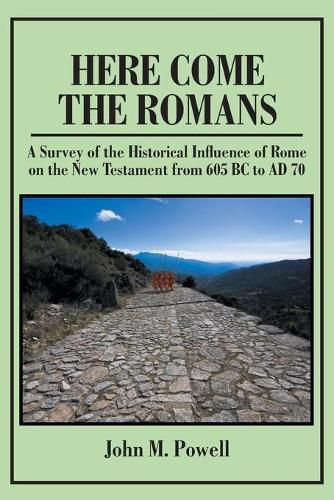Readings Newsletter
Become a Readings Member to make your shopping experience even easier.
Sign in or sign up for free!
You’re not far away from qualifying for FREE standard shipping within Australia
You’ve qualified for FREE standard shipping within Australia
The cart is loading…






This title is printed to order. This book may have been self-published. If so, we cannot guarantee the quality of the content. In the main most books will have gone through the editing process however some may not. We therefore suggest that you be aware of this before ordering this book. If in doubt check either the author or publisher’s details as we are unable to accept any returns unless they are faulty. Please contact us if you have any questions.
Here Come The Romans is a progressive survey on the historical influence of Rome and how it influenced the times, events, customs, religious institutions, and specifically the life of Jesus, the Jewish people, and the New Testament. Its progressive style guides the reader through a six-hundred and seventy-five-year period of selected history to educate how Rome fitted the Biblical narrative and story. The Bible ascribes divine inspiration to the Scriptures, but we often forget the human side. The birth of prophecy or all Scriptures originated out of human struggles, circumstances and situations. It is important to begin the discussion in the Old Testament in order to layout the ground-work. This book will teach and inform readers about the origin of parties, sects, authorities, and the background of the times that influenced the Biblical writers as they wrote the New Testament books. Rome had its starting point before 605 BC (viz. 753 BC), but its presence in the land of Judea and Jerusalem was not solidified until a little more than a half-century before the birth of Jesus Christ. It emerged from a simple monarchy, to a senate-ruled republic, and then into a major world superpower ruled by Caesars and Procurators. The presence of Rome, with Jews and Christians, vastly affected the writings of all twenty-seven New Testament books as we have them today.
$9.00 standard shipping within Australia
FREE standard shipping within Australia for orders over $100.00
Express & International shipping calculated at checkout
This title is printed to order. This book may have been self-published. If so, we cannot guarantee the quality of the content. In the main most books will have gone through the editing process however some may not. We therefore suggest that you be aware of this before ordering this book. If in doubt check either the author or publisher’s details as we are unable to accept any returns unless they are faulty. Please contact us if you have any questions.
Here Come The Romans is a progressive survey on the historical influence of Rome and how it influenced the times, events, customs, religious institutions, and specifically the life of Jesus, the Jewish people, and the New Testament. Its progressive style guides the reader through a six-hundred and seventy-five-year period of selected history to educate how Rome fitted the Biblical narrative and story. The Bible ascribes divine inspiration to the Scriptures, but we often forget the human side. The birth of prophecy or all Scriptures originated out of human struggles, circumstances and situations. It is important to begin the discussion in the Old Testament in order to layout the ground-work. This book will teach and inform readers about the origin of parties, sects, authorities, and the background of the times that influenced the Biblical writers as they wrote the New Testament books. Rome had its starting point before 605 BC (viz. 753 BC), but its presence in the land of Judea and Jerusalem was not solidified until a little more than a half-century before the birth of Jesus Christ. It emerged from a simple monarchy, to a senate-ruled republic, and then into a major world superpower ruled by Caesars and Procurators. The presence of Rome, with Jews and Christians, vastly affected the writings of all twenty-seven New Testament books as we have them today.